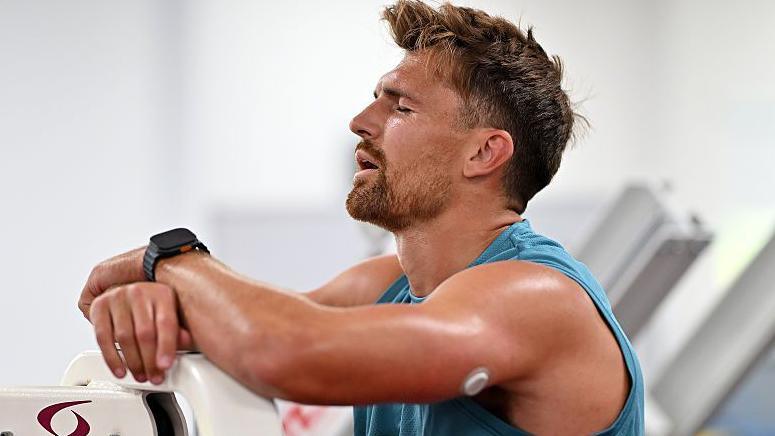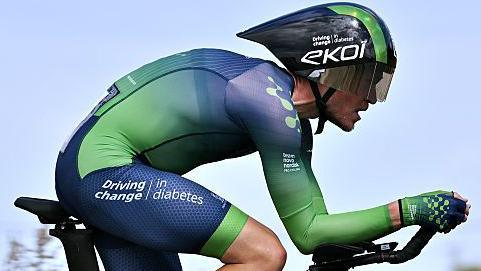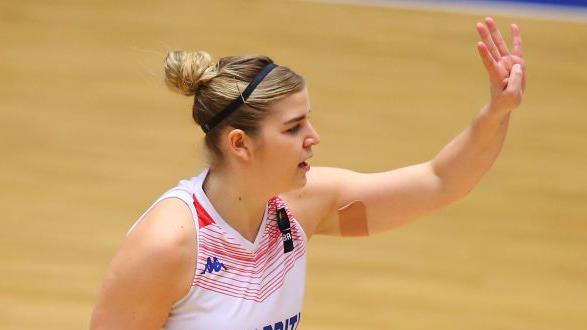I think about diabetes 'every five minutes' - Slade

Henry Slade has 73 caps for England
- Published
"It's a 24/7 thing. It's not something you can just forget about overnight."
When England international Henry Slade takes to the pitch on a match day, his mind is not just on the rugby.
He is thinking about his blood sugar levels.
"Every five minutes probably, you're thinking - how is this going to affect me?"
Slade is one of a number of high-profile athletes who have type 1 diabetes - an autoimmune condition where the body cannot make a hormone called insulin, which controls blood sugar levels. As a result, insulin needs to be taken daily, either through an injection, or a pump system.
Charity Diabetes UK estimates more than 5.8 million people in the UK are living with diabetes, which is an all-time high. Of those diagnosed, nearly 400,000 have type 1.
To mark World Diabetes Day, BBC Sport has spoken to three athletes about balancing their type 1 diabetes with elite sport.
What is life like for an athlete living with Type 1 Diabetes?
Ratios, weather and stress - 'I have to plan'
England centre Slade discovered he had diabetes by accident when he was 18.
A month before starting his professional career with the Exeter Chiefs, he and his school friends were messing around testing their sugar levels on a friend's blood testing kit.
His result was "pretty high" and the next day it was "even higher" so his parents took him to the doctors, who told him 'you're about to develop diabetes'."
His first thought was, "Can I still play?" The doctor's answer was "yes".
"As soon as I heard that, I said I'm never going to let it stop me doing what I want to do," he said.
"And that's the message I've tried to spread to people. It doesn't affect how much weight you can lift, how fast you can run, how fit you are, as long as your blood sugars are in the right zone."
Getting them there, though, is no easy task.
The 32-year-old wears a glucose monitoring device on his arm which is connected to his phone and watch, sending him constant updates and alerting him to signs of a sugar high or low.
"I have to plan how much I need to inject or what I'm going to be doing when I get to training," he said. "I'm figuring out how much carbohydrate I'm going to have for breakfast and how much I need to inject because it's sort of a ratio you work out."
Then throughout the whole day he thinks about questions like 'what time of day is it?', 'how cold is it?' and 'how are your stress levels?' because these factors can all affect his levels.
He found that on match days, adrenaline was sending his levels "through the roof" by half-time so he now injects insulin just before the match and at half-time.
"It's helped a lot because the adrenaline spikes your blood sugar levels," he said. "It affects the way you think, how you feel, your fatigue levels. So being able to control blood sugars is really important on game day."
Slade is passionate about raising awareness to help with early detection and addressing what he terms the condition's "scary" stigmas and confusion with type 2 diabetes, which is largely seen as linked to lifestyle.
"The majority of people I speak to just assume that it's because I ate too many sweets when I was a kid or had a bad diet growing up," he said.
"That's so far away from what it actually is. It's autoimmune, you can't control it. Anyone can get it, any time."

Slade has launched a 'Tackle Diabetes' campaign alongside healthcare company Sanofi
Emergency sweets
Professional cyclist Sam Brand was diagnosed at the age of 10 but his dream of being an elite athlete never waivered and he thinks his diabetes has in fact helped him.
"Diabetes gave me a routine, something that has been extremely beneficial in my journey as a cyclist," said the 34-year-old, who rides for Team Novo Nordisk, the first all-diabetes professional cycling team.
A comprehensive fuelling strategy is essential for any cyclist but for diabetics like Brand, an emergency bag of sweets is also important.
"I always carry Skittles on the bike because they're really quick acting. I was brought up on Jelly Babies but 24 years of those is too much so I'm trying other things now," he said.
There have, though, been some "scary experiences".
"There are so many times when you take a little bit too much correction [of insulin] than you should or you eat a bit too much and all of a sudden, you're in a situation where ambulances need to be called," he said.
"I get a tingling feeling in my hands and face, the blood drains from my face, I'll stop making sense because my brain goes in to energy-saving mode. I become irritable and agitated, lose vision, lose focus.
"It's difficult because you want to tell people 'I'm low, help' but in that moment, you become frozen and you can't always communicate properly."

Sam Brand represented the Isle of Man at the 2018 and 2022 Commonwealth Games
'Anything is possible'

Georgia Anderson hopes to be a role model for other athletes with type 1 diabetes
Former Great Britain basketball player Georgia Anderson remembers feeling "a little bit scared" when at the age of seven she was told she should not pursue a career in sport because of her diabetes.
But her father and coach Jeff Jones helped her manage the condition, often spotting the signs before she did if her blood sugar was going too low or high.
"He would ask, 'Am I good? Am I OK?', which for normal athletes is just a normal thing," she said.
"But for me, it meant 'Do you need to come off? Do you need to check your sugars? Do you need to have something to eat?"
When she was pregnant with her daughter she faced her biggest challenge of the condition and had to stop playing.
"It was really difficult to control my sugars and then throwing pregnancy hormones into that, it just became near impossible for me to exercise."
Anderson, 35, now plays for Manchester Basketball in the Super League and wants to be a role model for others.
"Growing up, I didn't have many people that I saw as diabetic athletes," she said. "But I continue to play basketball. Anything is possible. I hope I'm an example of that."